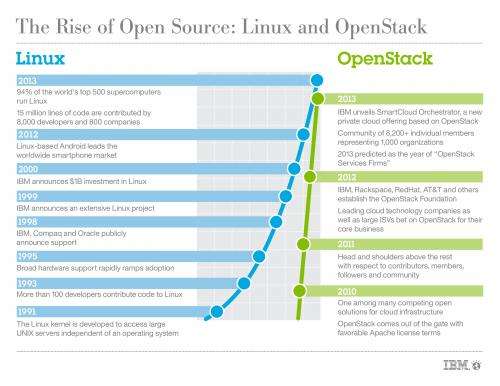IBM to make its cloud services and software open sourced-based

IBM today announced that all of its cloud services and software will be based on an open cloud architecture. This move will ensure that innovation in cloud computing is not hampered by locking businesses into proprietary islands of insecure and difficult-to-manage offerings. Without industry-wide open standards for cloud computing, businesses will not be able to fully take advantage of the opportunities associated with interconnected data, such as mobile computing and business analytics.
As the first step, the company today unveiled a new private cloud offering based on the open sourced OpenStack software that significantly speeds and simplifies managing an enterprise-grade cloud. Now, for the first time, businesses have a core set of open source-based technologies to build enterprise-class cloud services that can be ported across hybrid cloud environments.
"History has shown that open source and standards are hugely beneficial to end customers and are a major catalyst for innovation," said Robert LeBlanc, IBM senior vice president of software. "Just as standards and open source revolutionized the Web and Linux, they will also have a tremendous impact on cloud computing. IBM has been at the forefront of championing standards and open source for years and we are doing it again for cloud computing. The winner here will be customers, who will not find themselves locked into any one vendor—but be free to choose the best platform based on the best set of capabilities that meet that needs."
Based on customer-driven requirements, the new software, called IBM SmartCloud Orchestrator, gives clients greater flexibility by removing the need to develop specific interfaces for different cloud services. With the new software, companies can quickly combine and deploy various cloud services onto the cloud infrastructure by lining up the compute, storage and network resources with an easy-to-use graphical interface. The new IBM SmartCloud Orchestrator allows users to perform the following:
- Build new cloud services in minutes by combining the power of pattern-based cloud delivery, with a graphical orchestrator for simple composition of cloud automation;
- Reduce operational costs with an orchestrator that can automate application deployment and lifecycle management in the cloud: compute, storage and network configuration, human tasks automation, integration with third party tools, all delivered by a single cloud management platform and;
- Simplify the end user consumption of cloud services, via an intuitive self service portal, including the ability to measure the cost of cloud services with metering and charge-back capabilities.
The development of open industry standards has proven a critical turning point in the success of many technologies, such as the Internet and operating systems. For cloud computing to grow and mature similar to its predecessors, vendors must stop creating new cloud services that are incompatible. A recent report by Booz & Company warned that without a more concerted effort to agree on such standards, and leadership on the part of major companies, the promise of cloud computing may never be reached.
IBM is applying its experience in supporting and validating open standards from Linux, Eclipse and Apache to cloud computing. Working with the IT community, IBM is helping to drive the open cloud world by:
- Creating a 400-member strong Cloud Standards Customer Council that grew from about 50 members at launch;
- Sponsoring OpenStack Foundation as a platinum and founding member and as one of the top code and design contributors to all OpenStack projects;
- Driving related cloud standards, such as Open Service for Lifecycle Collaboration, Linked Data in the W3C and TOSCA in OASIS, to enhance cloud application portability;
- Dedicating more than 500 developers on the open cloud projects and;
- Working closely with the OpenStack Foundation, along with its 8,200+ members from 109 countries and 1,000 organizations.
IBM Orchestrator is expected to be available later this year. IBM SmartCloud Monitoring Application Insight is expected to be available in the second quarter of the year. The analytics beta programs are expected to be available by the end of March.
More information: For more information about cloud offerings from IBM, visit www.ibm.com/smartcloud
Provided by IBM



















